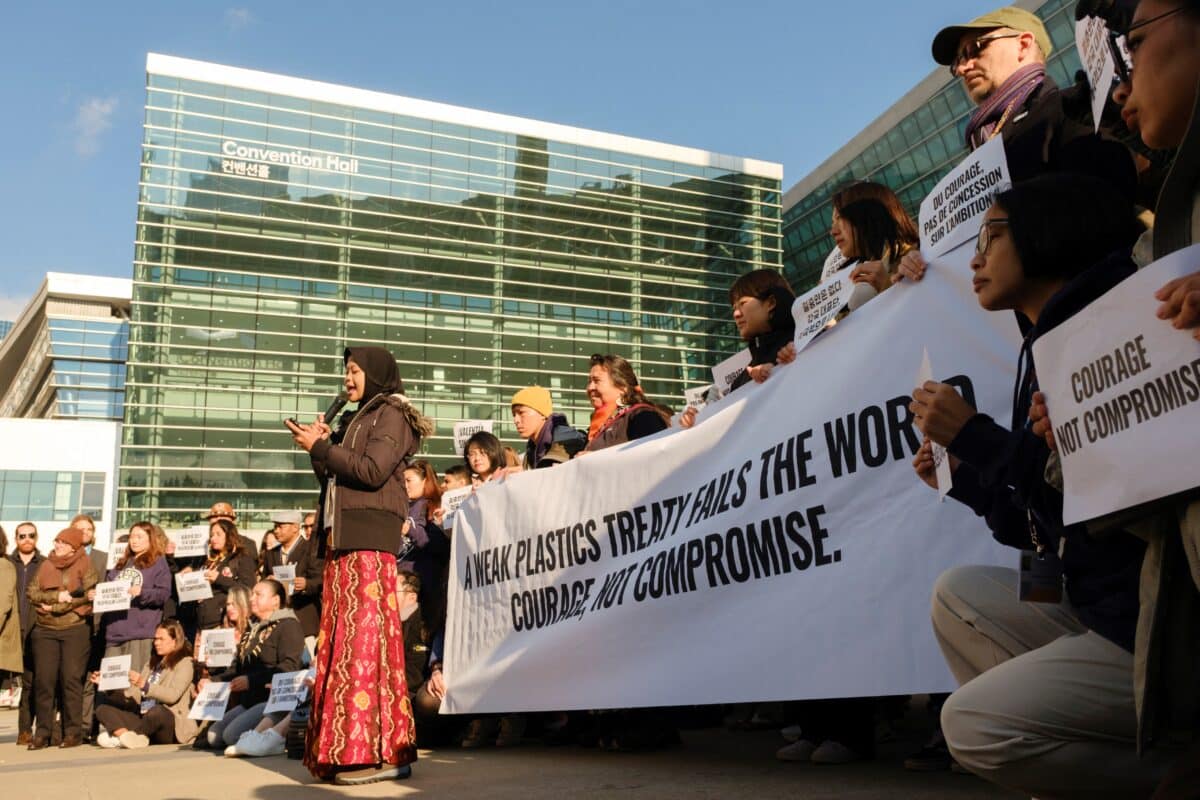No accord on plastic pollution deal, more time needed – chair

Environmental activists demonstrate in front of the Bexco convention center in Busan on November 29, 2024, where international negotiations on a binding treaty against plastic pollution are being held. (Photo by Roland de Courson / AFP)
BUSAN, South Korea — Negotiators have failed to reach an agreement on a landmark treaty to curb plastic pollution, the diplomat chairing the talks said on Sunday, calling for additional time to continue discussions.
Nearly 200 nations are in South Korea’s Busan for negotiations that are supposed to result in a landmark accord after two years of discussions.
But a week of talks has failed to resolve deep divisions between “high-ambition” countries seeking a globally binding agreement to limit production and phase out harmful chemicals, and “like-minded” nations who want to focus on waste.
A draft text released Sunday afternoon after multiple delays included a wide range of options, making clear the ongoing level of disagreement.
When an open plenary session finally convened late Sunday night, chair Luis Vayas Valdivieso said progress had been made.
But he acknowledged “we must also recognize that a few critical issues still prevent us from reaching a comprehensive agreement.”
“These unresolved issues remain challenging and additional time will be needed to address them effectively,” he said.
“There is a general agreement to resume the current session at a later date to conclude our negotiations.”
‘Obstruction’
His comments reflected earlier calls from delegates for a follow-up to the so-called INC5 talks given the ongoing divisions.
“If you ask me… we stop, we adapt the paper as it is and we try to do another session,” Senegal’s Cheikh Sylla told AFP.
That would offer time “to bring the positions closer together, and at this session 5.2, we can reach an agreement that is balanced.”
Earlier, delegations seeking an ambitious treaty warned that a handful of countries were steadfastly blocking progress.
A French minister accused the like-minded group of “continuing obstruction,” while Rwandan delegate Juliet Kabera said a “small number” of countries “remain unsupportive of the measures necessary to drive real change.”
“Rwanda cannot accept a toothless treaty,” said Kabera.
While countries have declined to directly name those preventing a deal, public statements and submissions have shown mostly oil-producing nations including Saudi Arabia and Russia have sought to block production cuts and other ambitious goals.
Portuguese delegate Maria Joao Teixeira said earlier Sunday that another round of talks might be the best option for a meaningful deal.
“We are really trying to not have a weak treaty,” she told AFP.
But environmental groups had pushed ambitious countries to call a vote if progress stalls, and said another round of negotiations was unnecessary.
“We know what we need to do to end plastic pollution… simply adding more meetings is not the solution,” said Eirik Lindebjerg, global plastics policy lead at WWF.
‘Step up or get out’
Over 100 countries support setting a target for production cuts, and dozens also back phasing out some chemicals and unnecessary plastic products.
Left unclear is the position of the world’s top two plastics producers, China and the United States. Both were notably absent from the stage at a Sunday press conference by countries urging a strong treaty.
“They are still considering and we are hopeful that there will be some interest on their part,” said Mexico’s head of delegation Camila Zepeda.
“This coalition of the willing is an open invitation. And so it’s not like it’s them against us.”
Panama’s Juan Carlos Monterrey Gomez meanwhile told colleagues that “history will not forgive us” for leaving Busan without an ambitious treaty.
“This is the time to step up or get out.”